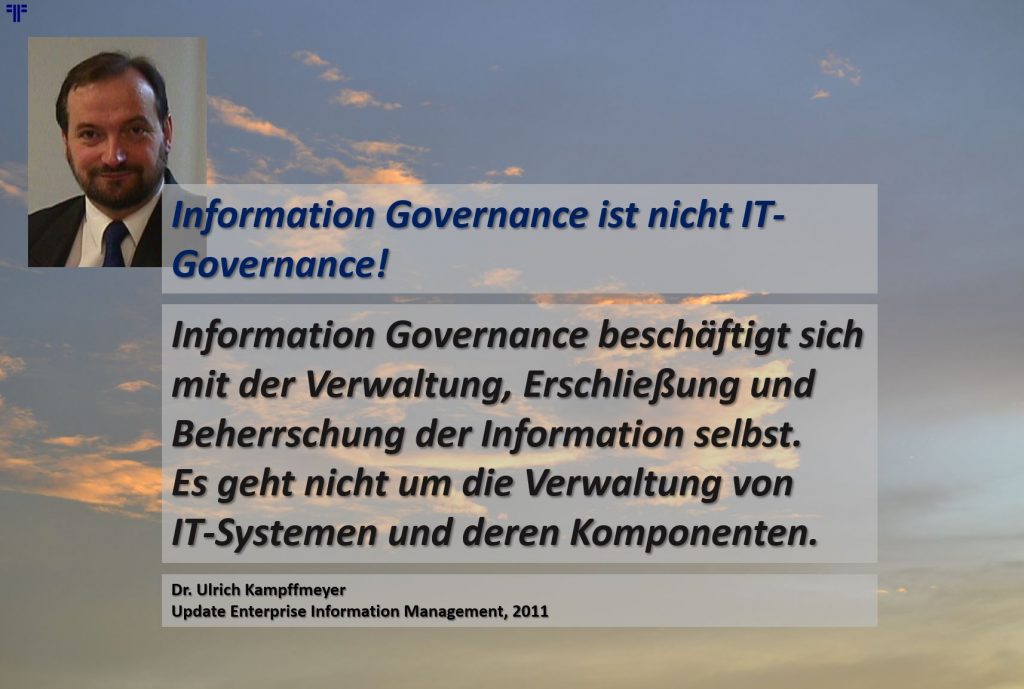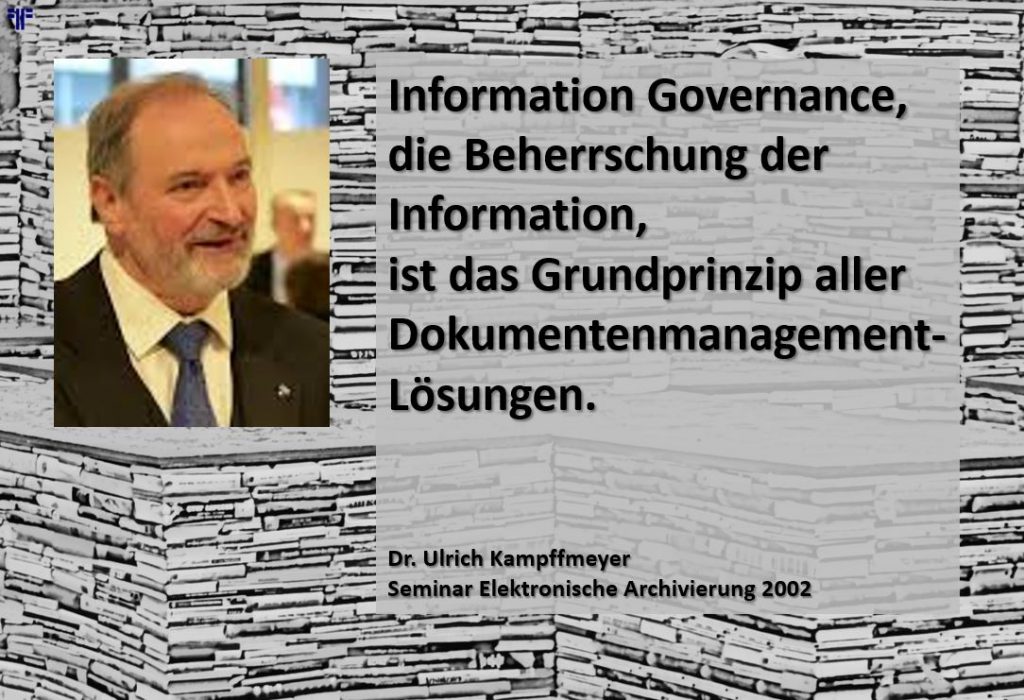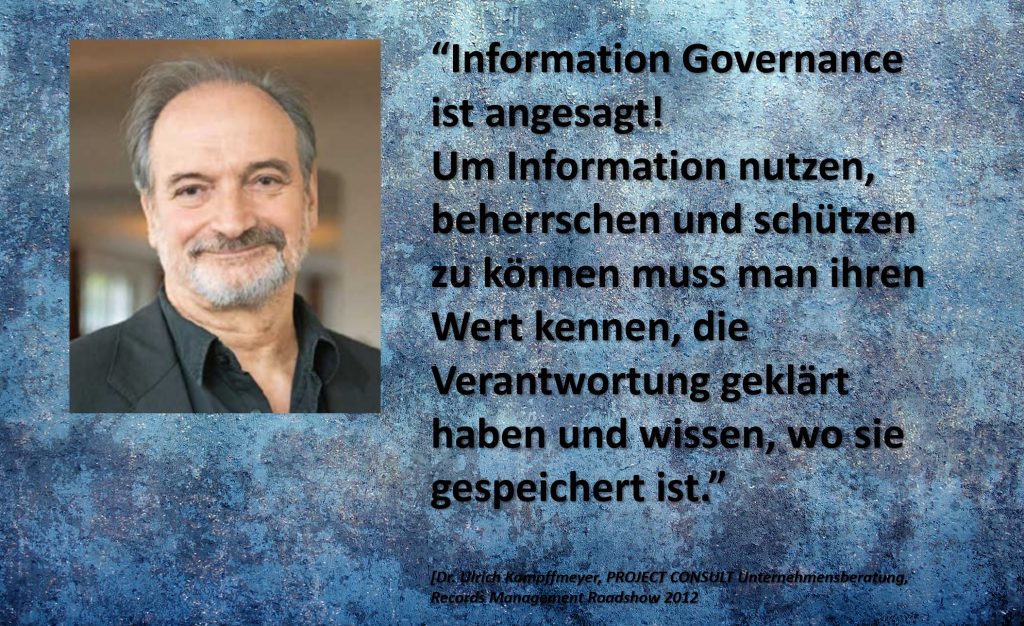Information Governance – „eine Grundierung“
24. Januar 2023 10:43 Uhr | Dr. Ulrich Kampffmeyer | Permalink

Information Governance – A Primer ist der Titel eines Artikels, den Dr. Ulrich Kampffmeyer auf Einladung der katalanischen „Associació de Professionals de l’Arxivística i la Gestió de Documents de Catalunya“ für deren Publikationsreihe Lligall (https://arxivers.com/publicacions/revista-lligall/) verfasst hat. Die 7 Kapitelüberschriften lauten:
1 Introduction: Definitions & Principles
2 ISO 24143:2022 Information Governance
3 Records Management
4 Challenges for Information Governance
5 The Future of Information Governance
6 Summary
7 Literature
Der Artikel findet sich in den „Essentials“ hier: https://bit.ly/IGprimer.
In der Zusammenfassung schreibt der Autor:
„Es gibt eine Vielzahl von Definitionen und Grundsätzen für Information, Governance, Informationsmanagement und Information Governance. Es geht darum, die wachsende Menge an digitalen Informationen zu verwalten, Informationen richtig zu nutzen und die Kontrolle über sie zu behalten.
Information Governance bezieht sich auf die Verwaltung der Verfügbarkeit, Integrität und Sicherheit von Informationen innerhalb einer Organisation. Sie umfasst die Prozesse, Richtlinien und Praktiken, mit denen sichergestellt werden soll, dass Informationen ordnungsgemäß erfasst, verwaltet und genutzt werden. Information Governance ist kein Grundsatzdokument im Regal, sondern wird in der täglichen Arbeit und bei Transaktionen umgesetzt.
Die Bedeutung der Information Governance liegt in ihrer Fähigkeit, die Organisation vor Risiken zu schützen, die mit dem falschen Umgang mit Informationen verbunden sind. Dazu gehören Risiken wie rechtliche Verpflichtungen, Datenverluste und Rufschädigung. Durch die Einführung effektiver Information-Governance-Praktiken können Unternehmen sicherstellen, dass ihre Informationen korrekt, vollständig und sicher sind, was zu einer besseren Entscheidungsfindung beiträgt und das Unternehmen vor potenziellen Schäden schützt.
Heute ist es keine Frage mehr, ob man eine übergreifende Information Governance braucht – sie ist ein absolutes Muss. Es ist wichtig zu erkennen, dass es bei der Information Governance nicht nur um Systeme und Lösungen geht, sondern auch um Menschen, die bei ihrer täglichen Arbeit alle IG-Maßnahmen durchführen.
Die Norm ISO 24143:2022 „Information Governance“ ist ein nützlicher, aktueller Standard für die Ausbildung, die „Missionsarbeit“, den Entwurf, die Implementierung und die Aufrechterhaltung einer effektiven Information Governance.
Es gibt eine ganze Reihe von Herausforderungen bei der Umsetzung und Aufrechterhaltung – und diese Herausforderungen wachsen mit dem Fortschritt der Automatisierung, der künstlichen Intelligenz, des maschinellen Lernens und der Big-Data-Analytik. Neben den technologischen Fortschritten darf der Faktor Mensch nicht außer Acht gelassen werden.
Neue Technologien sind eine Chance für die Etablierung einer Information Governance. Richtig eingesetzt, helfen sie, mit all den neuen Softwareeigenschaften, verteilten und Cloud-Umgebungen und sich selbst generierenden Funktionen den Überblick zu behalten. Information Governance kann nicht mehr manuell verwaltet werden, Information Governance selbst muss automatisiert werden.“




Wir freuen uns über Anregungen und Kommentare zu dem Beitrag hier in unserem Blog!
Translation by Deepl.com
„Information Governance – A Primer“ is the title of an article written by Dr. Ulrich Kampffmeyer at the invitation of the Catalan „Associació de Professionals de l’Arxivística i la Gestió de Documents de Catalunya“ for their publication series Lligall (https://arxivers.com/publicacions/revista-lligall/). The 7 chapter headings are:
1 Introduction: Definitions & Principles
2 ISO 24143:2022 Information Governance
3 Records Management
4 Challenges for Information Governance
5 The Future of Information Governance
6 Summary
7 Literature
The article can be found in the „Essentials“ here: https://bit.ly/IGprimer.
Abstract
The article deals with the importance of information governance (IG, InfoGov) for electronic information. At the beginning, definitions for information, governance, information governance, information management and GRC governance, risk management and compliance with their principles are presented. The following focus is on the ISO standard 24143 Information Governance from 2022 as a useful guideline for implementation. Digital records management is presented as an essential tool for the implementation of governance measures and is also distinguished from information governance. Ten current challenges for information governance are discussed. The chapter on the future of information governance looks at new opportunities such as cloud, data analytics, automation and artificial intelligence. The conclusion is that without consistent information governance across all information in an organization, effective protection and efficient use of information is not possible. The automation of information governance is the only way to manage and control the growing amount and heterogeneity of information.
In the summary the author writes:
6 Summary
There are a lot of definitions and sets of principles for information, governance, information management and information governance. All comes down to manage the rising amount of digital information, to make proper use of information and to stay in control of information.
Information Governance refers to the management of the availability, integrity, and security of information within an organization. It encompasses the processes, policies, and practices that are put in place to ensure that information is properly collected, managed, and used. Information governance is not the policy document in the shelf but implemented into day-to-day work and transactions.
The importance of Information Governance lies in its ability to protect the organization from risks associated with the mishandling of information. This includes risks such as legal liabilities, loss of data, and reputational damage. By implementing effective Information Governance practices, organizations can ensure that their information is accurate, complete, and secure, which can help to improve decision-making and protect the organization from potential harm.
Today, it is no longer a question of whether you need an overarching information governance – it is an absolute must. It is important to recognize, that information governance is not about systems and solutions, but as well about people, to execute all IG measures during their daily work.
ISO 24143:2022 “Information Governance” is a useful, up-to-date standard for educating, doing “missionary work”, designing, implementing and maintaining an effective information governance.
There are quite a lot of challenges to the implementation and maintenance – and these challenges grow with the progress of automation, artificial intelligence, machine learning and bigdata analytics. Besides advances of technology do not overlook the human factor.
New technologies are a chance for the establishment of an information governance. Adequately used they help to keep track with all the new software properties, distributed and cloud-environments, and self-generating functionality. Information governance no longer can be managed manually, information governance itself must get automated.
We welcome suggestions and comments as answers the post here on our blog!

Governança de la informació: un manual
Der Grundlagenartikel „Governança de la informació: un manual“ ist jetzt in der Fachzeitschrift LLIGALL, Ausgabe 46, 2023, Seite 15 bis 47, erschienen: https://bit.ly/3HXa8W3. Die Reihe LLIGALL wird von der Associació de Professionals de l’Arxivística i la Gestió de Documents de Catalunya herausgegeben.
In der katalanischen Übersetzung des ursprünglichen, englischsprachigen Beitrags (https://bit.ly/IGprimer), wird ein Problem sichtbar, das es offenbar in mehreren Sprachen gibt: der Begriff „Record“, abgeleitet aus dem Records Management, wird mit „Document“ übersetzt. So lautet Kapitel 3 „Gestió de documents“ anstelle „Records Management. Dokumentenmanagement ist allerdings etwas anderes als normiertes Records Management. Es wäre ein guter Zeitpunkt gewesen, den englischsprachigen originären Begriff Records Management auch in Katalonien einzuführen – jedoch bemerkte ich das Übersetzungsproblem erst, als ich den Preprint der katalanischen Fassung erhielt – und da war es für eine Änderung oder zumindest Erläuterung in einer Anmerkung, bereits zu spät 🙁 .
——————- English translated with Deepl.com ———————
The basic article „Governança de la informació: un manual“ has now been published in the professional journal LLIGALL, issue 46, 2023, pages 15 to 47: https://bit.ly/3HXa8W3. The LLIGALL series is published by the Associació de Professionals de l’Arxivística i la Gestió de Documents de Catalunya.
In the Catalan translation of the original English-language contribution (https://bit.ly/IGprimer), a problem becomes visible that apparently exists in several languages: the term „record“, derived from records management, is translated as „document“. Thus, Chapter 3 reads „Gestió de documents“ instead of „Records Management. However, document management is something different from standardised records management. It would have been a good time to introduce the original English-language term records management in Catalonia as well – but I only noticed the translation problem when I received the preprint of the Catalan version – and by then it was already too late for a change or at least an explanation in a note 🙁 .
——————– Español traducido con Deepl.com ———————–
El artículo básico „Governança de la informació: un manual“ acaba de ser publicado en la revista profesional LLIGALL, número 46, 2023, páginas 15 a 47: https://bit.ly/3HXa8W3. La serie LLIGALL está editada por la Associació de Professionals de l’Arxivística i la Gestió de Documents de Catalunya.
En la traducción al catalán de la contribución original en inglés (https://bit.ly/IGprimer), se hace visible un problema que aparentemente existe en varios idiomas: el término „record“, derivado de records management, se traduce como „documento“. Así, en el capítulo 3 se lee „Gestió de documents“ en lugar de „Records Management“. Sin embargo, la gestión de documentos es algo distinto de la gestión de registros normalizada. Hubiera sido un buen momento para introducir el término original en inglés records management también en Cataluña – pero sólo me di cuenta del problema de traducción cuando recibí el preprint de la versión catalana – y para entonces ya era demasiado tarde para un cambio o al menos una explicación en una nota 🙁 .
================== Abstracts ======================
———– Resum —————
L’article tracta de la importància de la governança de la informació (GI, InfoGov) pel que fa a la informació electrònica. Comença amb un repàs a les diferents definicions que hi ha d’informació, governança, governança de la informació, gestió de la informació, i governança, gestió de riscos i acompliment (GRC) i els principis que hi estan relacionats. A continuació, se centra en la norma ISO 24143:2022 sobre la governança de la informació i la manera com aquesta norma funciona com a guia útil per implantar-la. L’article presenta la gestió de documents digitals com una eina essencial en l’aplicació de mesures de governança i analitza com es diferencia de la governança de la informació. Tot seguit, enumera els deu reptes a què s’enfronta actualment la governança de la informació abans de donar un cop d’ull al seu futur
i a les noves oportunitats, com ara el núvol, l’anàlisi de dades, l’automatització i la intelligència artificial. L’article conclou assenyalant que només amb una governança coherent de la informació a tota l’organització serà possible la protecció efi aç i l’ús eficient de la informació. L’automatització de la governança de la informació és l’única manera de gestionar i controlar l’augment de la quantitat i heterogeneïtat de la informació.
PARAULES CLAU: Governança de la informació, definicion, informació, governança, gestió de la informació, gestió documental, ISO 24143, reptes, núvol, automatització, intelligència artificial
———— Resumen ————————-
El artículo trata de la importancia de la gobernanza de la información (GI, InfoGov) para la información electrónica. Comienza con un repaso a las distintas definiciones que existen de información, gobernanza, gobierno de la información, gestión de la información, y gobernanza, gestión de riesgos y cumplimiento (GRC) y los principios relacionados. A continuación, se centra en la norma ISO 24143:2022 sobre gobernanza de la información y la manera como esta norma actúa como guía útil para su implantación. El artículo presenta la gestión de documentos digitales como una herramienta esencial en la aplicación de medidas de gobernanza y analiza cómo se diferencia de la gobernanza de la información. A continuación, enumera los diez retos a los que se enfrenta actualmente la gobernanza de la información antes de echar un vistazo a su futuro y a las nuevas oportunidades como la nube, el análisis de datos, la automatización y la inteligencia artificial. El artículo concluye señalando que solo con una gobernanza coherente de la información en toda la organización será posible la protección eficaz y el uso eficiente de la información. La automatización de la gobernanza de la información es la única forma de gestionar y controlar el aumento de la cantidad y heterogeneidad de la información.
PALABRAS CLAVE: Gobernanza de la información, definiciones, información, gobernanza, gestión de la información, gestión documental, ISO 24143, retos, nube, automatización, inteligencia artificial
————- Résumé ——–
L’article aborde l’importance de la gouvernance de l’information (GI, InfoGov) pour l’information électronique. Il commence par un recueil des différentes définitions de l’information, de la gouvernance, de la gouvernance de l’information, de la gestion de l’information, et de la gouvernance, gestion des risques et conformité (GRC) qui existent et les principes qui y sont liés. Il se concentre
ensuite sur la norme ISO 24143:2022 relative à la gouvernance de l’information et sur la manière dont cette norme constitue un guide utile pour la mise en œuvre de la GI. L’article présente la gestion des documents numériques comme un outil essentiel à la mise en œuvre de mesures de gouvernance et explique en quoi elle diffère de la gouvernance de l’information. Il énumère ensuite les dix défis auxquels la gouvernance de l’information est actuellement confrontée avant de s’intéresser à l’avenir de la gouvernance de l’information et aux nouvelles opportunités telles que le cloud, l’analyse des données, l’automatisation et l’intelligence artificielle. Il conclut sur le fait que seule une gouvernance de l’information# cohérente dans l’ensemble d’une organisation permettra une protection efficace et une utilisation efficiente de l’information. L’automatisation de la gouvernance de l’information est le seul moyen de gérer et de contrôler la quantité croissante et l’hétérogénéité accrue des informations.
MOTS CLÉS: Gouvernance de l’information, définitions, information, gouvernance, gestion de l’information, gestion documentaire, ISO 24143, défis, cloud, automatisation, intelligence artificielle
—————— Abstract ——————
The article deals with the importance of information governance (IG, InfoGov) for electronic information. It opens with a look at the different definitions of information, governance, information governance, information management, and governance, risk management and compliance (GRC) that exist and their related principles. It then focuses on ISO 24143:2022 on information governance and how this standard acts as a useful guideline for IG implementation. The article presents digital records management as an essential tool in implementing governance measures and discusses how it differs from information governance. It then lists the ten challenges currently facing information governance before taking a look at the future of information governance and new opportunities such as the cloud,data analytics, automation and artificial intelligence. It closes by saying that only with consistent information governance across an organisation will the effective protection and efficient use of information be possible. The automation of information governance is the only way to manage and control the growing amount and increased heterogeneity of information.
KEYWORDS: Information governance, definitions, information, governance, information management, records management, ISO 24143, challenges, cloud, automation, artificial intelligence
—————— Zusammenfassung ——————
Der Artikel befasst sich mit der Bedeutung von Information Governance (IG, InfoGov) für elektronische Informationen. Er beginnt mit einem Blick auf die verschiedenen Definitionen von Information, Governance, Information Governance, Informationsmanagement und Governance, Risikomanagement und Compliance (GRC) und die damit verbundenen Grundsätze. Anschließend wird auf die ISO 24143:2022 über Information Governance eingegangen und erläutert, wie diese Norm als nützlicher Leitfaden für die Umsetzung von IG dient. Der Artikel stellt die Verwaltung digitaler Aufzeichnungen (Records Management) als wesentliches Instrument zur Umsetzung von Governance-Maßnahmen vor und erörtert, wie sie sich von der Information Governance unterscheidet. Anschließend werden die zehn Herausforderungen aufgelistet, mit denen die Information Governance derzeit konfrontiert ist, bevor ein Blick auf die Zukunft der Information Governance und neue Möglichkeiten wie die Cloud, Datenanalyse, Automatisierung und künstliche Intelligenz geworfen wird. Abschließend wird festgestellt, dass nur mit einer einheitlichen Information Governance in einem Unternehmen ein wirksamer Schutz und eine effiziente Nutzung von Informationen möglich ist. Die Automatisierung der Information Governance ist die einzige Möglichkeit, die wachsende Menge und zunehmende Heterogenität von Informationen zu verwalten und zu kontrollieren.
KEYWORDS: Information Governance, Definitionen, Information, Governance, Informationsmanagement, Records Management, ISO 24143, Herausforderungen, Cloud, Automatisierung, künstliche Intelligenz
LLigall 46 - Preprint version
Dear Ulrich,
Thank you for your blog entry! We are going to publish online the english version of your article as soon as possible.
I would like to talk with you for another question. I am using the ISO 24143 standard for information governance for several projects, and trying to develop some complementary methodologies. I would like to ask you if you know examples of methodologies for the analysis and inventory of the different elements that participate in information governance: processes, computer applications, archival aggregations, data, etc. I am looking for methodological references, but I hardly find anything, and I would know if there are standards or methodologies that develop in practice the ISO 24143.
Thank you so much!
Jordi Serra Serra
Complementary Methodologies for ISO 24143
Querido Jordi,
lamentablemente solo hoy tengo tiempo para responder a tu correo electrónico. Lamentablemente, no existen herramientas estándar. Considero que sería útil tener lo siguiente:
(1) Informationslandkarte (mapa de paisaje de información)
En este se recopilan y mantienen todas las clases de información con sus ubicaciones de almacenamiento, propiedades, propietarios, plazos de retención, clases de acceso, etc. Para organizaciones más pequeñas, una hoja de cálculo Excel sería suficiente, mientras que para organizaciones más grandes, se puede desarrollar una pequeña base de datos.
(2) Vorlagen (plantillas)
Sería útil contar con una colección de plantillas para la Política de Información, la Política de Gobierno de Información, la Política de Gestión de Registros, la Documentación de Impuestos y Auditorías, la Política de Privacidad, Instrucciones de Trabajo/Procedimientos Operativos Estándar, etc.
(3) Risk-Management-Assessment and Management Tool
La norma ISO se enfoca en la gestión de riesgos. Por lo tanto, tiene sentido contar con una plantilla en Excel o una base de datos para enumerar y hacer un seguimiento de todos los riesgos, su probabilidad, las contramedidas planificadas, etc.
(4) Information Governance Maturity Models
Los modelos de madurez son útiles para evaluar el estado de la organización en relación con la gestión de la información y planificar medidas.
Hemos estado utilizando estas herramientas en nuestro trabajo de consultoría. Hay diapositivas y videos sobre „Informationslandkarte“ en https://project-consult.theum.com/essentials/index.htm?t=Teams-Pr%C3%A4sentationen-Presentations,2021,20210311-webinar-ulrich-kampffmeyer–mit-ecm-zu-effektiver-information-governance–ser,wissen-%C3%BCber-die-information~3a-die-informationslandkarte—1 , https://project-consult.theum.com/essentials/index.htm?t=Publikationen-Publications,PROJECT-CONSULT-Update-Information-Management-Tagungsb%C3%A4nde,update-information-management-2018—digitale-transformation—fast-forward—tagungsband—project-consult-unternehmensberatung-dr.-ulrich-kampffmeyer-gmbh,update-information-management-2018—digitale-transformation—fast-forward—tagungsband—project-consult-unternehmensberatung-dr.-ulrich-kampffmeyer-gmbh-(19).
También se pueden encontrar otras herramientas como modelos de madurez en nuestros ESSENTIALS en https://project-consult.theum.com/essentials/index.htm?t=Teams-Themen-Topics,Information-Management-Themen-von-PROJECT-CONSULT,reifegradmodelle-information-management—-themen—project-consult.com,reifegrad-modelle,project-consult-eim-reifegradmodell&h=sde545fc86c989169402a35855e0b11ab , https://project-consult.theum.com/essentials/index.htm?t=Teams-Artikel-Articles,2022,ulrich-kampffmeyer—reifegradmodelle–20220120,reifegradmodelle&h=sd3c970b904282146704f1c4e1d81f27b,sb695c011a4a374395c9c31ef286aae79,sc1d0b8c7ffd113be1cca52cdbee369bd.
Atentamente,
Uli